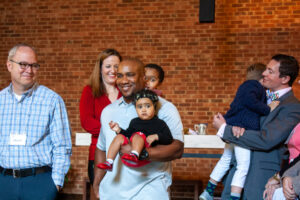Replanting as a Family
When I was twelve years old, I saw down in the living room with my mom, dad, brother, and sister. My dad was having a family pow-wow with us, and it seemed important. “Kids,” he said,” Me and your mother love you all. And I want you to know that God is calling your Dad to serve another church.”
My dad had been serving at Bethel Baptist Church in Sycamore, GA, since before I was born, and we would be leaving the church where I had grown up to move to a new town. As a twelve-year-old, that move was difficult, but also exciting. From a young age, it taught me that my Dad’s call to ministry involved the whole family.
This week, on a special episode of the podcast, our host, Jimbo, had his whole family on the channel to talk about the joys and challenges of having a family during a Replant. If you haven’t listened, I encourage you to listen to this one and take special note of a replant from his children’s perspective. These are good things to know, not just for Replanters but for all ministers and church leaders. To summarize, I’ll give a few topics of the conversation.
Making Quality Time with Your Kids:
As your children grow up, what they will remember most and have the most significant impact on them is the time you have spent with them. Life is busy, and ministry is full-time, no matter what your job description entails. It seems like, in ministry, it is extra difficult to “leave work at home.” Though my children are three years old and six months old, they have already spent countless hours with my wife and me at the church on weekends or at my office for a few extra hours.
There are times when that is necessary. We have full-time roles, and there are projects to complete and things to take care of. But when we get home after a long day, we put our phones away and spend quality time with our kids. For our 6-month-old, it’s laying on the floor, having face-time with her, holding her, and caring for her. For our 3-year-old, it’s playing with monster trucks and cars, running around outside, and watering the plants together. Our kids will remember those small moments, and it instills in them the love and care we have for them.
Maybe your kids are older. Sometimes, we forget that while our kids have different likes and interests, we can always put away our “things” and spend quality time with them. Don’t neglect quality time. Every once in a while, we must put the phone or TV away, play some games, and do some silly dances with our kiddos. You’ll be glad you did.
Being Present at Home
Another way we can be intentional with our families is by being present at home. It is possible to be home without being at home. One example mentioned was being at home but checking work emails or working on your next sermon during family dinner to catch up. We must remember that our first ministry is always to our family. That extra 20 minutes for sermon prep may have to suffer a bit. I would rather have an underdeveloped sermon than neglect my family.
Focusing on our pastoral ministry does not have to come at the expense of neglecting our family ministry. This is why time management and balance are so important. If you have to, schedule every hour of your day so that you can schedule time to be present and intentional with your family. We must learn to say “not this time” when ministry opportunities present themselves for the sake of family time.
Raising them with Grace
 Another great insight shared in this podcast was raising your kids to be good kids but not raising them to be a “pastor’s kid.” What do we mean? Children in ministry must not be raised with the impossible expectation of being a perfect, rule-following child as an example for other kids. In other words, we must not expect them to be ideal role models for the rest of the kids. Sometimes, we put high religious expectations on our kids, and they fear imperfection and feel the weight of pressure that no child should bear.
Another great insight shared in this podcast was raising your kids to be good kids but not raising them to be a “pastor’s kid.” What do we mean? Children in ministry must not be raised with the impossible expectation of being a perfect, rule-following child as an example for other kids. In other words, we must not expect them to be ideal role models for the rest of the kids. Sometimes, we put high religious expectations on our kids, and they fear imperfection and feel the weight of pressure that no child should bear.
We must raise our kids to be great kids, not perfect kids. Yes, others will look at them and watch their lives. But we should normalize authenticity and grace rather than a facade of perfection that even we cannot maintain.
Creating Core Values for Your Family
At the end of this episode, the Stewart family began discussing their core values. I talked about this concept with Jimbo and loved their ideas. After he and his wife talked about how to raise their children, they came up with some core values they would instill at a young age and include in meaningful conversations with them. The four values they chose were respect, integrity, self-control, and joyfulness.
As each kid spoke, it became apparent that this was a significant part of their upbringing. I want to encourage you, the reader, to think of the same thing to implement with your family. Even if your kids are preteens or teenagers, it’s still something you can do.
Whether you are looking for a better work/life balance, learning how to lead your family spiritually, or struggling relationally at home, a good starting point is recognizing that if you have a family, your family is your first ministry. Let us know how we can encourage you to find the necessary balance in this pursuit.



 On the other side, we must not shy away from all discussion and ignore the issues surrounding us. Faithful preaching will simply preach the word, but make application of the word to the congregation. If your church is a voting poll, or a gathering place during the week for city meetings, utilize your people and place to show the love of Christ to the community. For example, this can be done by handing out snacks and water bottles, and praying over people as they walk out. We must lead by example, helping our people see the need of living on Mission for Jesus Christ.
On the other side, we must not shy away from all discussion and ignore the issues surrounding us. Faithful preaching will simply preach the word, but make application of the word to the congregation. If your church is a voting poll, or a gathering place during the week for city meetings, utilize your people and place to show the love of Christ to the community. For example, this can be done by handing out snacks and water bottles, and praying over people as they walk out. We must lead by example, helping our people see the need of living on Mission for Jesus Christ.














 Listen to this announcement: “On [this date], we are going to have time to gather together and hear some exciting updates from our ministries. It will also be a time to enjoy fellowship and pray together about important matters. We want to communicate some updates that require your input as a church member. So, let me encourage you to try to be here on that day.”
Listen to this announcement: “On [this date], we are going to have time to gather together and hear some exciting updates from our ministries. It will also be a time to enjoy fellowship and pray together about important matters. We want to communicate some updates that require your input as a church member. So, let me encourage you to try to be here on that day.”









 Written by
Written by 
 As a reminder, almost
As a reminder, almost